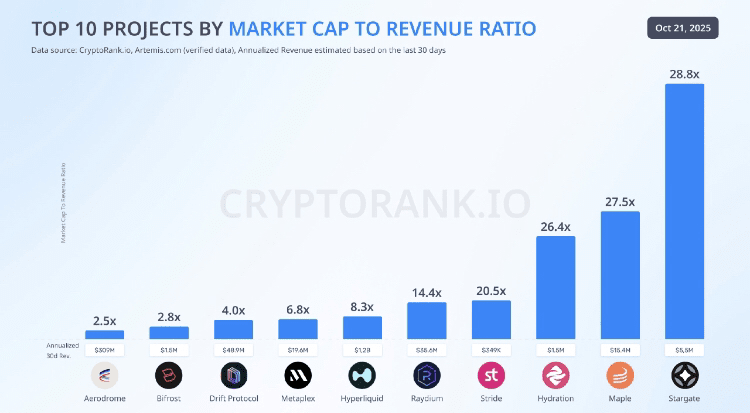I just shared a highly important list showing the top 10 projects in terms of evaluation efficiency based on the Market Cap-to-Revenue Ratio. This type of data highlights projects that generate massive revenues compared to their current market value, indicating that they may be undervalued or have high operational efficiency.

An exciting analysis of this distinguished list:
* Aerodrome - explosive efficiency (2.5x):
* Aerodrome tops the list with an astonishing ratio of just 2.5x, meaning the market value of the project is 2.5 times its annual revenues.
* With annual revenues of $309 million and a market value of approximately $762 million,
Aerodrome is a living example of a project that generates very strong cash flows relative to its current valuation. This ratio is the strongest and puts the project in the spotlight as one of the most efficient assets in valuation.
* Strong competitors at the top (2.8x - 8.3x):
* Projects like Bifrost (2.8x), Drift Protocol (4.0x), Metaplex (6.8x), and Hyperliquid (8.3x) follow next, and they also show very excellent ratios. This indicates a range of projects with strong infrastructure that generate actual and substantial revenues from their activities.
* The second half of the list (14.4x - 28.8x):
* Projects in the lower half like Raydium (14.4x), Stride (20.5x), and Stargate Finance (28.8x) are still considered good when compared to many traditional companies, but they require more revenue growth to reduce the ratio and match the efficiency at the top.
What do these ratios mean?
In financial analysis, a lower ratio indicates that the project is undervalued relative to the revenues it generates, or that it is more efficient in converting its activity into actual revenues. For investors, these projects are often attractive because they provide tangible evidence of a successful and sustainable business model.
Important note on risks (Risk Disclaimer):
Remember that the cryptocurrency market is highly volatile. This information is for educational and analytical purposes only and should not be considered investment advice. Investment decisions require in-depth study of risks, and you should always conduct your own research.